- Clone
- 14G4B17 (See other available formats)
- Regulatory Status
- RUO
- Other Names
- Peroxisome proliferator-activated receptor gamma, PPAR gamma, NR1C3
- Isotype
- Mouse IgG1, κ
- Ave. Rating
- Submit a Review
- Product Citations
- publications
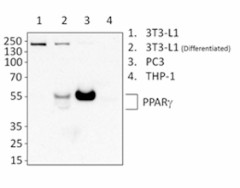
-

Total cell lysate from mouse 3T3-L1 cells (lane 1), differentiated 3T3-L1 cells (lane 2), human PC3 cells (lane 3), and human THP-1 cells (lane 4) were resolved by electrophoresis, transferred to nitrocellulose, and probed with purified monoclonal anti-human/mouse PPARγ (clone 14G4B17) antibody. Proteins were visualized using an HRP Goat anti-mouse IgG (minimal x-reactivity) Antibody and chemiluminescence detection. -

PC3 cells were fixed with 4% paraformaldehyde (PFA) for 10 minutes, permeabilized with 0.5% Triton X-100 for five minutes, and blocked with 5% FBS for 30 minutes. Then the cells were intracellularly stained with 2 µg/ml anti-human/mouse PPARγ (clone 14G4B17) antibody for two hours followed by Alexa Fluor® 594 Goat anti-mouse IgG (minimal x-reactivity) Antibody (red) for one hour at room temperature. Actin filaments were labeled with Alexa Fluor® 488 Phalloidin (green). Nuclei were counterstained with DAPI (blue). The image was captured by a 60X objective.
| Cat # | Size | Price | Quantity Check Availability | Save | ||
|---|---|---|---|---|---|---|
| 683402 | 100 µg | 231€ | ||||
PPARγ, also known as NR1C3, is a ligand-dependent transcription factor belonging to the peroxisome-proliferator activated receptor (PPAR) family. Upon activation by its ligands, such as fatty acids and prostaglandin PGJ2, PPARγ forms heterodimers with the retinoid X receptors (RXRs) and binds to DNA specific PPAR response elements (PPRE). In the absence of ligand, the PPARγ/RXR heterodimer represses its target genes by recruiting and stabilizing the corepressor complexes at the promoter regions. PPARγ is expressed most abundantly in adipose tissue and induced during adipocyte differentiation. PPARγ has been suggested to regulate the expression of key genes involved in glucose metabolism, lipid storage, energy homeostasis, adipogenesis, atherosclerosis, inflammation, and cancer.
Product DetailsProduct Details
- Verified Reactivity
- Human, Mouse
- Antibody Type
- Monoclonal
- Host Species
- Mouse
- Immunogen
- Synthetic PPARγ peptide conjugated to KLH (CETDMSLHPLLQEIYKDLY)
- Formulation
- Phosphate-buffered solution, pH 7.2, containing 0.09% sodium azide.
- Preparation
- The antibody was purified by affinity chromatography.
- Concentration
- 0.5 mg/ml
- Storage & Handling
- The antibody solution should be stored undiluted between 2°C and 8°C.
- Application
-
WB - Quality tested
ICC - Verified - Recommended Usage
-
Each lot of this antibody is quality control tested by Western blotting. For Western blotting, the suggested use of this reagent is 0.5 - 2.5 µg/ml. For immunocytochemistry, a concentration range of 1.0 - 5.0 μg/ml is recommended. It is recommended that the reagent be titrated for optimal performance for each application.
- Product Citations
-
- RRID
-
AB_2572020 (BioLegend Cat. No. 683402)
Antigen Details
- Structure
- 505 amino acids with an approximate molecular weight of 57.6 kD. Contains two zinc finger domains responsible for DNA binding.
- Distribution
-
Nucleus.
- Function
- PPARγ is a nuclear receptor that modulates transcription of its target genes. It plays crucial roles in inflammation, energy homeostasis, and adipocyte differentiation.
- Interaction
- PPARγ interacts with FOXO1, RXRA, PPARBP, ASXL1, ASXL2, DNTTIP2, FAM120B, MAP2K1/MEK1, NR0B2, PDPK1, PRDM16, PRMT2 and TGFB1I1.
- Biology Area
- Cell Biology, Transcription Factors
- Molecular Family
- Nuclear Markers
- Antigen References
-
1. Majithia AR, et al. 2014. Proc. Natl. Acad. Sci. USA 111:13127.
2. Aprile M, et al. 2014. PPAR. Res. 2014:537865.
3. Pott S, et al. 2013. PLoS One 7:e48102.
4. Klemke M, et al. 2011. Cancer Genet. 204:334.
5. Folwaczny M, et al. 2011. Innate Immun. 17:541.
6. Fuentes P, et al. 2010. J. Endocrinol. 206:75. - Gene ID
- 5468 View all products for this Gene ID
- UniProt
- View information about PPARgamma on UniProt.org
Related Pages & Pathways
Pages
Related FAQs
Other Formats
View All PPARγ Reagents Request Custom Conjugation| Description | Clone | Applications |
|---|---|---|
| Purified anti-PPARγ | 14G4B17 | WB,ICC |
Customers Also Purchased
Compare Data Across All Formats
This data display is provided for general comparisons between formats.
Your actual data may vary due to variations in samples, target cells, instruments and their settings, staining conditions, and other factors.
If you need assistance with selecting the best format contact our expert technical support team.

 Login / Register
Login / Register 





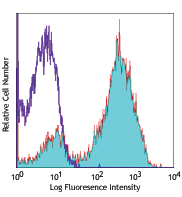
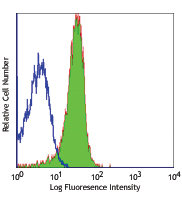
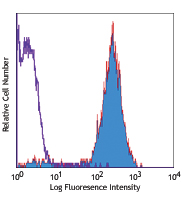
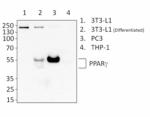
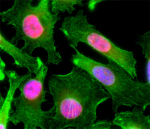



Follow Us